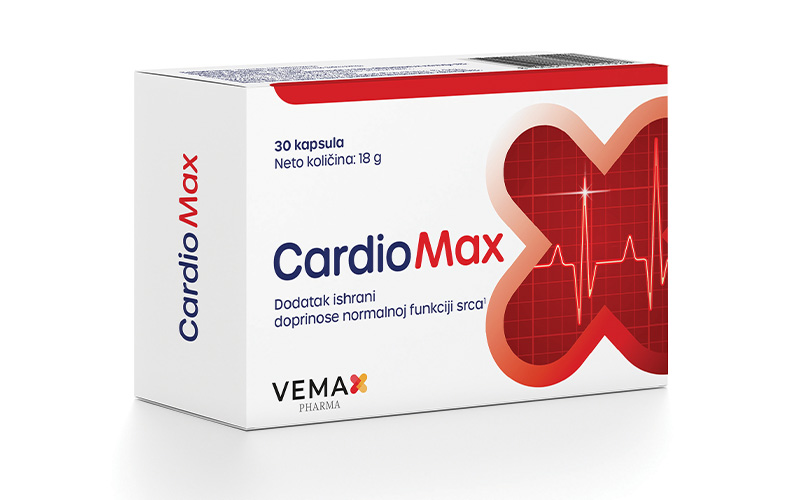Cardio Max
Unique combination of 10 active ingredients for the treatment of dyslipidemia, cardiovascular and cerebrovascular diseases.
Cardio Max
Cardio Max is a unique combination of 10 active ingredients for the treatment of dyslipidemia, cardiovascular and cerebrovascular diseases.
Effect on the cardiovascular system
- reduces atherosclerotic plaques
- reduces the risk of cardiovascular events and mortality
Regulation of fat and sugar levels in the blood
- ↓ LDL, ↑ HDL, ↓ triglycerides
Effect on the central nervous system
- reduces the risk of cerebrovascular events and mortality
- improves short-term and long-term memory
Composition:
- Omega-3 from shrimp oil (Krill Oil):
- high bioavailability
- lowers triglycerides by 11%
- lowers cholesterol by 13%
- lowers LDL by 32%
- increases HDL by 44%
- no unpleasant smell or taste
- Phospholipids
- Contribute to better transport through the cell membrane and bioavailability of active ingredients.
- Astaxanthin
- The most potent antioxidant (about 6000 times stronger than vitamin C and 550 times stronger than vitamin E)
- Q10 of natural origin
- recommended as a supplement to statins and beta blockers that lead to coenzyme Q10 deficiency – less possibility of muscle fatigue
- recommended for patients with cardiomyopathy and heart failure
- Magnesium
- contributes to electrolyte balance, energy generation and nervous system function
- Iron
- Vitamin B6
- Vitamin B12
- contributes to the formation of red blood cells
- contributes to the normal functioning of the immune system
- contributes to energy generation and plays an important role in cell division
- Selenium protects cells from oxidative stress and contributes to strengthening the immune system
- Zinc contributes to DNA formation, fatty acid metabolism, protects cells from oxidative stress
Shrimp oil – has superior antioxidant activity!
54 times stronger antioxidant than fish oils
Astaxanthin
A powerful antioxidant that crosses the blood-brain barrier and therefore exhibits antioxidant properties on brain tissue as well.
It has a positive effect on:
- Cerebrovascular ischemia
- Ischemic heart disease
- Atherosclerosis
- Anti-inflammatory effect
(regulation of NO, TNF and PGE2 production and inhibition of NF-kb and IL-1b)
Study conclusions and recommendations:
Maximum effect in the first months after myocardial infarction – significant early effect on total mortality in the first 3 months after MI and on sudden cardiac death after 4 months.
Adding statins reduces the risk of major coronary events by 19%.
A positive effect on the heart and the process of atherosclerosis:
- ↓ Malignant ventricular arrhythmias (myocyte membrane stabilization)
- ↓ Heart rates
- ↑ Endothelial relaxation (via ↑NO & ↑NO independent mechanisms)
- ↓ Blood Pressure
- ↓ Sudden Cardiac Death
- ↓ Total and CV mortality
Anti-proliferative effect (↓ proliferation of smooth muscle cells)
Antithrombotic effect (↓ platelet reactivity, ↓ AK)
Anti-inflammatory effects (↓ Inflammatory cytokines, ↓ Mitogens, ↓ Expression of adhesion molecules)
Place of application:
- patients with severe lipid disorders
- patients on statin or beta-blocker therapy (+ Q10)
- patients with myocardiopathy and/or heart failure (+ Q10)
- An alternative to statin therapy
In monotherapy (the patient does not have to use a statin or postpones the use of a statin)
- Three months of diet and supplementation and in high-risk patients – drugs are not introduced immediately
- Achieving the target values – excludes the need for the introduction of statins – there is no fear of side effects of statins
- Found in Guidelines: National Guidelines on Lipid Disorders
In secondary CVD prevention – statin + Cardio Max
Additive effect in combined therapy with statins in reducing CV events and lipid correction
- Administration of lower doses of statins – lower risk of side effects of statins
- Greater safety compared to fibrates in combination therapy with statins
Instead of statins in patients who do not tolerate them or do not want to take them
Disturbance of lipid status
- An increase in cholesterol levels by 2-3% increases the risk of ischemic heart disease by 1%
- By lowering the level of LDL cholesterol, morbidity and mortality can be reduced by 40%
- Increasing the level of HDL by 1 mg/dl lowers the risk of cardiovascular diseases by 2-3%
- An increase in the level of triglycerides (TCG) is an independent risk factor for the occurrence of cardiovascular diseases
Desirable values of lipid fractions for the general population:
Recommendation National guidelines
Total cholesterol < 5,2 mmol/l
LDL < 3,4 mmol/l
HDL < 1,6 mmol/l
Triglycerides < 1,7 mmol/l
Recommendation European guidelines
Total cholesterol
LDL < 3,0 mmol/l
HDL > 1,0-1,2 mmol/l (m/f)
Triglycerides < 1,7 mmol/l
Target values of LDL cholesterol depending on the level of risk – European recommendations:
Moderate risk – LDL < 3,0 mmol/l
High risk – LDL < 2,5 mmol/l
Very high risk – LDL < 3,0 mmol/l
Limiting effect of statin use
- Statins have a limited effect on ↓TCG and ↑HDL!
- Statin therapy still carries a high cardiovascular risk
- Adverse effects of statins are common and serious (FDA warning): diabetes, CNS (confusion and forgetfulness), hepatotoxicity, rhabdomyolysis, myalgias, muscle cramps
- There are a number of interactions of statins with fibrates, anticoagulants, digoxin and other cytochrome P450 inhibitors!
Packaging:
30 capsules without lactose and gluten
Write to us
Mosorska 9, 11000 Belgrade, Serbia
Vemax011 Pharma doo representative office Northern Macedonia - Dane Krapcev 13, Skopje
Vemax011 Pharma doo representative office Montenegro - Topliški put 1, Budva
Vemax011 Pharma doo representative office Bosnia and Hercegovina - Vlakovo 252, Sarajevo
+381 (0)63 103 00 08
office@vemaxpharma.rs
Vemax Pharma - your trusted regional partner on the road to health!

